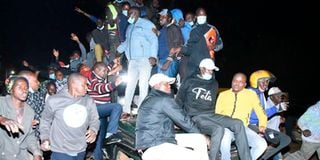Premium
Why Kenyans won’t mourn BBI’s death

Residents of Eldoret celebrate in the streets on August 20, 2021 after the Court of Appeal threw out the BBI process.
What you need to know:
- A majority of Kenyans didn’t feel the constitutional moment manufactured by President Uhuru Kenyatta and ODM party leader Raila Odinga.
- The stubbornness with which the pro-BBI elite pushed for a constitutional referendum in the middle of a pandemic was even more strange.
It says a lot about Building Bridges Initiative (BBI) that its fall at the Court of Appeal on Friday hasn’t put the country in a period of national mourning.
Apart from a video showing a small crowd of Deputy President William Ruto’s long-suffering fans celebrating in Eldoret and social media posts by commentators awed by Justice Patrick Kiage’s eloquence, the rest of Kenyans appear largely indifferent about what went down in the court.
The muted public reaction confirms the argument that there was never a real constitutional moment in Kenya in the first place.
Away from the stage-managed public rallies where pro-BBI politicians danced to reggae songs, a majority of Kenyans didn’t feel the constitutional moment manufactured by President Uhuru Kenyatta and ODM party leader Raila Odinga after their surprise political truce in March 2018.
The BBI mysteriously survived death by acclamation in May 2021 when a joint committee of the Senate and the National Assembly diagnosed some terminal clauses in the constitutional amendment Bill, but the legislators were bullied into passing it anyway.
By the time it arrived at the High Court later that month, it was clinically dead and even the most compassionate judges couldn’t have saved it.
The stubbornness with which the pro-BBI elite pushed for a constitutional referendum in the middle of a pandemic was even more strange.
Referendum campaign rallies
Between June and July when the referendum was supposed to have been held, a third wave of Covid-19 infections was sweeping through Kenya’s towns and villages. The surge in infections had exploded on the back of super-spreader rallies held across the country to promote or counter BBI, prompting the President to impose partial lockdowns and extend the night curfew.
Something notable about the third wave was the sheer number of politicians who had been taken ill with the disease, lending credence to reports that the public rallies were fuelling transmission.
And while they skillfully recounted their experiences with Covid-19 and won lots of public sympathy, they conveniently avoided mentioning the role of the political class in spreading the virus.
Neither did they drop any hints of guilt at the economic privileges that enabled them to survive the disease as many Kenyans died due to lack of ICU beds, oxygen, PPEs, or paracetamols in public hospitals.
More recently, President Kenyatta’s administration has come under criticism for the low rollout of Covid-19 vaccination amid the pandemic’s continued ravaging of the economy.
Only 1.5 per cent of eligible Kenyans are fully vaccinated so far while the daily positivity rates reported by the Ministry of Health oscillate around 15 per cent.
The country remains on the travel advisory lists of the UK and the US. A resurgence of referendum campaign rallies would have made the Covid-19 situation much worse. The Court of Appeal judges have done well to stop the Covid super-spreaders in their tracks.
[email protected]. @otienootieno





